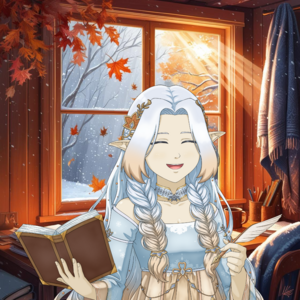Back on Orion's Scope, we watched as the hidden base was consumed by its own destruction. The rogue faction’s dangerous experiment was over, but the implications of what we had discovered lingered.
"We need to report this to the Council," Dr. Quinnley said. "They need to know what happened here."
Nickodemeus nodded. "Agreed. But we also need to be prepared. If there’s one rogue faction out there, there could be more."
As we made our way back to the core of civilization, I couldn’t help but reflect on the journey. We had averted disaster and uncovered a dangerous secret, but the universe was vast, and there were still so many mysteries to unravel. Nickodemeus decided to build an observatory on the site so Dr. Quinnley can help us to monitor any unusual activity and help to keep the people living there safe. Nickodemeus approached us and took the gems he normally carries on his lapel.
“These are Lacaille and Rigel,” Nick said “They are the stars that helped me create the train and will also help me create the observatory” he then proceeded to take a bottle of Star Drops.
As Nickodemeus opened the bottle, a luminescent liquid began to flow. He carefully poured a few drops onto each gem. Instantly, the gems began to glow with a brilliant light, casting intricate patterns of illumination across the walls. The sight was mesmerizing.
Dr. Quinnley leaned in closer, her scientific curiosity piqued. "These gems, Lacaille and Rigel, what do they do specifically?"
"They serve as anchors," Nick explained. "Lacaille will harness the energy of the Star Drops, and Rigel will focus it. Together, they create a powerful synergy that can stabilize complex structures and enhance observational capabilities."
As Nickodemeus continued to work with the Star Drops and the gems, I pondered the broader implications of our mission. The rogue faction we had encountered was just one piece of a much larger puzzle. The universe was teeming with hidden dangers and secret experiments, and it was our duty to uncover and neutralize them.
The journey back to the core of civilization was long, giving us plenty of time to prepare our report for the Council. We detailed every aspect of the mission, from the initial discovery of the rogue base to the final moments of its destruction. The Council needed to understand the gravity of the situation and the potential threats that still lurked in the shadows.
Upon our arrival, we were greeted with a mix of relief and apprehension. The Council members, a group of seasoned leaders and scholars, listened intently as we presented our findings. Their expressions grew increasingly grave as we described the rogue faction's experiment and the catastrophic consequences it nearly unleashed.
"This is troubling indeed," Councilor Alden said, stroking his chin thoughtfully. "We must remain vigilant and enhance our monitoring capabilities. The observatory you plan to build will be crucial in this endeavor."
Nickodemeus stepped forward, presenting the now-energized gems. "With these, we can create an observatory that will give us unprecedented insight into the cosmos. We will be able to detect any unusual activity and respond swiftly to potential threats."
The Council members exchanged nods of agreement, their concern giving way to a renewed sense of purpose. "Very well," Councilor Alden declared. "You have our full support. Proceed with the construction of the observatory, and keep us informed of any developments."
With the Council's blessing, we set to work. The chosen site for the observatory was a secluded moon on the fringes of our solar system, far from prying eyes but ideally positioned for deep-space observation. The construction process was complex, requiring both advanced technology and a touch of Nickodemeus's unique brand of mysticism.
As the days turned into weeks, the observatory began to take shape. The main structure, a towering edifice of sleek metal and crystalline glass, stood as a testament to our resolve. Inside, the heart of the observatory—the fusion of Lacaille and Rigel—hummed with energy, ready to scan the cosmos for any sign of danger.
Dr. Quinnley and her team worked tirelessly to calibrate the instruments, fine-tuning the sensitivity of the detectors and ensuring that the data they collected would be both accurate and comprehensive. The observatory was not just a scientific facility; it was a sentinel, a guardian watching over the galaxy.
As we neared the completion of the project, I found myself standing on the observation deck, gazing out at the vast expanse of space. The stars glittered like diamonds against the velvet backdrop, each one a reminder of the countless mysteries waiting to be uncovered.
Nickodemeus joined me, his expression contemplative. "It's a beautiful sight, isn't it?"
I nodded, feeling a sense of awe and responsibility. "It is. And it's up to us to protect it."
He placed a hand on my shoulder, his grip firm and reassuring. "We will. With this observatory, we'll be able to anticipate threats and act before they can cause harm. The universe is vast, but so is our determination."
As the observatory came online, its powerful sensors began to sweep the cosmos, collecting data and transmitting it back to our control center. We monitored the feeds constantly, vigilant for any sign of unusual activity. The information we gathered was invaluable, providing insights into the behavior of celestial bodies and the movements of distant star systems.
One day, as we were analyzing a particularly intriguing data set, Dr. Quinnley called us over. "Look at this," she said, pointing to a series of spikes on the graph. "These fluctuations are highly unusual. They could be indicative of an artificial disturbance."
Nickodemeus examined the data, his brow furrowed in concentration. "You're right. This pattern is consistent with the kind of energy signatures we observed at the rogue base. We need to investigate."
The Council agreed, authorizing a new mission to locate the source of the disturbance. We prepared the Orion's Scope for another journey, our resolve steeled by the knowledge that we were not alone in our quest to protect the galaxy.
As we ventured into the unknown, the observatory continued to monitor the cosmos, its unblinking eye ever watchful. We knew that the road ahead would be fraught with challenges, but we were ready to face them head-on. The universe was vast, and there were still so many mysteries to unravel.
Our journey took us to the edge of known space, to a region shrouded in cosmic dust and electromagnetic interference. The disturbance we had detected originated from a small, uncharted planet orbiting a dying star. As we approached, we could see the remnants of ancient structures on its surface, half-buried in the shifting sands.
"We need to be cautious," Nickodemeus warned. "Whatever caused those energy fluctuations could still be active."
We landed the Orion's Scope on the planet's surface, the airlock hissing as it equalized the pressure. Stepping out onto the barren landscape, we felt a sense of foreboding. The silence was oppressive, broken only by the faint hum of our equipment.
Dr. Quinnley scanned the area with her handheld device. "The readings are strongest in that direction," she said, pointing towards a cluster of ruins.
We made our way cautiously, our senses on high alert. As we entered the ruins, we discovered a series of tunnels leading deep underground. The walls were lined with strange symbols, their meaning lost to time.
"These markings," Nickodemeus said, tracing his fingers over the symbols. "They look similar to the ones we saw at the rogue base. This must be connected."
As we ventured further into the tunnels, we came across a large chamber filled with advanced machinery. In the center of the room stood a device, pulsing with energy. It was unlike anything we had ever seen, a fusion of ancient technology and modern innovation.
Dr. Quinnley approached the device, her eyes wide with fascination. "This must be the source of the disturbance. But what is it doing here?"
Nickodemeus examined the device, his expression thoughtful. "It appears to be some kind of generator, harnessing the energy of the dying star to power something. But what?"
As we pondered the device's purpose, a sudden realization struck me. "What if this is another experiment? A continuation of the rogue faction's work?"
Nickodemeus's eyes widened. "If that's true, we need to shut it down. We can't risk another disaster."
Dr. Quinnley nodded in agreement. "But we need to be careful. If we disable it incorrectly, it could cause a catastrophic release of energy."
Working together, we carefully dismantled the device, deactivating its power source and ensuring that it could not be reactivated. As the machine powered down, the energy readings on our scanners began to stabilize.
"We did it," Nickodemeus said, letting out a sigh of relief. "But we need to report this to the Council. They need to know that the rogue faction's influence extends further than we thought."
As we made our way back to the Orion's Scope, I couldn't help but feel a sense of unease. The discovery of the underground device raised more questions than answers. How many more of these experiments were out there? And who was behind them?
Upon our return, we briefed the Council on our findings. Their reactions mirrored our own concerns.
"This is deeply troubling," Councilor Alden said. "We must increase our efforts to uncover and neutralize these threats. The observatory will play a key role in this, but we also need to mobilize additional resources."
With the Council's support, we launched a new initiative to investigate potential rogue activity across the galaxy. The observatory's enhanced capabilities allowed us to identify and track unusual energy signatures, leading us to previously undiscovered bases and hidden installations.
Each mission brought us closer to understanding the scope of the rogue faction's operations. We uncovered a network of interconnected facilities, each one conducting experiments that posed a significant threat to galactic stability. The faction's ultimate goal remained unclear, but their actions were increasingly bold and reckless.
As our efforts intensified, we faced growing resistance. The rogue faction was aware of our activities and began to employ more sophisticated defenses. Our missions became more dangerous, and we suffered losses along the way. But we pressed on, driven by the knowledge that the safety of the galaxy depended on our success.
One day, as we were analyzing data from the observatory, Dr. Quinnley made a startling discovery. "I've found something," she said, her voice tinged with excitement and urgency. "A pattern in the energy signatures. It looks like a map."
Nickodemeus and I hurried over to her workstation, where a holographic display showed a series of interconnected points scattered across the galaxy.
"It's a network," Nickodemeus said, his eyes narrowing. "These are the locations of the rogue faction's bases."
Dr. Quinnley nodded. "And if we follow the pattern, it leads to a central point. This must be their headquarters."
The Council convened an emergency session to discuss our findings. The implications were clear: we had the opportunity to strike at the heart of the rogue faction and dismantle their operations once and for all.
"We must proceed with caution," Councilor Alden advised. "This will be a dangerous mission, but it's our best chance to put an end to this threat."
With the Council's approval, we prepared for the most critical mission of our careers. The Orion's Scope was outfitted with additional armaments and defensive systems, and we assembled a team of elite operatives to assist us.
As we approached the central point indicated by the map, we encountered heavy resistance. The rogue faction had fortified their headquarters, and a fierce battle ensued. Our ship took heavy fire, but we pressed on, determined to reach our goal.
After what felt like an eternity, we breached the outer defenses and landed on the surface of the rogue faction's stronghold. The atmosphere was tense as we advanced through the facility, encountering numerous traps and hostile forces.
Finally, we reached the heart of the base, where we found a massive control room filled with advanced technology. At its center stood a figure, cloaked in shadow, who turned to face us as we entered.
"You've come far," the figure said, their voice cold and calculating. "But you cannot stop what has already begun."
Nickodemeus stepped forward, his gaze unwavering. "We will stop you. Your experiments have caused enough harm."
The figure laughed, a sound devoid of humor. "You don't understand. We are on the brink of a new era. One where we control the very fabric of the universe."
As the figure raised their hand, a surge of energy crackled through the air. We braced ourselves for the impending attack, but Nickodemeus reacted swiftly, using the power of Lacaille and Rigel to counter the energy surge.
A fierce battle ensued, our combined efforts pitted against the rogue leader's formidable abilities. The room shook with the intensity of the conflict, and it seemed as though the very walls would collapse around us.
In a final, desperate move, Nickodemeus channeled the full power of the Star Drops through the gems, creating a blinding burst of light that enveloped the room. When the light faded, the rogue leader lay defeated, their plans thwarted.
As we secured the facility and began dismantling the rogue faction's operations, I felt a sense of profound relief. We had faced incredible odds and emerged victorious. The galaxy was safer, thanks to our efforts.
Returning to the observatory, we were greeted as heroes. The Council praised our bravery and dedication, and we were given the highest honors for our service.
But as I stood on the observation deck, gazing out at the stars, I knew that our work was far from over. The universe was vast, and there would always be new threats and challenges to face. But with the observatory watching over us and the unwavering determination of our team, I felt confident that we could overcome any obstacle.
The journey had been long and arduous, but it was only the beginning. The mysteries of the cosmos awaited, and we were ready to unravel them, one discovery at a time.










